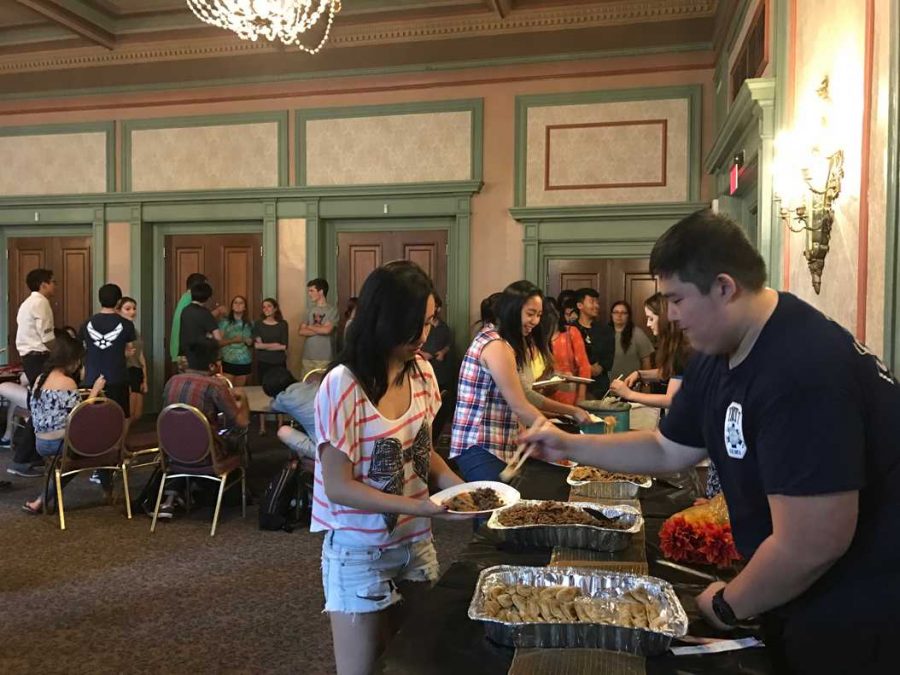Pitt student Paige Bruckner spent her Friday night racing others to down a cup of spicy Korean ramen.
With the tangy, spicy scent of the dish wafting through the air, Bruckner slurped the noodles, tipped back her head and hastily swallowed the remaining broth.
As part of the celebration of Chuseok, or Korean Thanksgiving, Bruckner and nine other guests competed to finish the Korean dish first in the Kurtzman Room of the William Pitt Union. With shaking hands and sweaty brows, participants slurped the soup, which contains ramen noodles mixed with spices including garlic, pepper and soy sauce and hot peppers.
The spicy ramen challenge was one of several games played at Pitt’s Korean Conversation Club’s third annual Chuseok dinner Friday night, an event to celebrate the traditional Korean holiday and introduce students to Korean culture. About 40 Pitt students celebrated with a combination of Korean and American games and a buffet of traditional Korean cuisine.
Bruckner, a sophomore computer science major, beat out the other competitors by eating her noodles in about one minute. Bruckner won a bouquet of flowers and a gift card to Oishii Bento, a Korean-Japanese restaurant on Oakland Avenue. This is her first year participating in the club, which she joined because she plans to study abroad in Korea.
“Tonight was pretty fun. I definitely plan on staying involved as long as I’m taking Korean I,” she said.
The night kicked off with the introduction of the club’s officers and then a short speech by Yun-Oh Whang, a Korean-American assistant professor of business administration at Pitt, who was there to answer questions about Korea and the holiday.
“Chuseok is similar to the American holiday of Thanksgiving, as it brings families together at the end of the harvest season,” he said.
In the Korean heritage, the holiday is a time for families to honor their ancestors and come together to exchange gifts and eat songpyeon — rice cakes made with sesame seeds, red beans, chestnuts or other similar ingredients.
Whang, who attended college in Korea, said that 25 years ago, when he was at Pitt for his master’s degree, there was little interest in Korean culture. Now, he is excited to see the club — and Pitt students — embracing Korean traditions.
“It’s wonderful that they’re holding this,” Whang said. “As a Korean who lived in America for most of my life, I’m glad that the Korean culture is becoming so popular in the U.S.”
A mixture of Korean and American pop music blasted over the speakers as guests of all nationalities were invited to divide into two groups and participate in a variety of games, some of American origin and some of Korean.
Channeling Korean traditions, guests also played Kai, Bai, Bao — the Korean equivalent of Rock, Paper, Scissors, where two opposing members from each team face off against each other at a time. The loser has to sit out, and the team with the most individual winners remaining wins.
Throughout the night, participants also played games that tested their Korean knowledge or teamwork and problem solving skills. In one game, inspired by a Korean variety show called “Running Man,” players moved oranges down a line of people without using their arms and hands. Instead, players used their necks and the backs of their knees to shuffle the fruit down the line.
After playing, guests sat down to a dinner of common Korean dishes alongside American candy and soda. The four main dishes were japchae, which consists of cold noodles mixed with vegetables and spices; bulgogi, which is beef marinated in a mixture of sauces and spices; mulmandu, or boiled dumplings, and white rice.
These four dishes are mainstays of Korean Thanksgiving Day, along with fruit, Korean pancakes, songpyeon and hangwa –– an artisinal dish made with rice, honey and fruits and decorated in colored patterns.
Most of the food came from Eliza Kang’s parents, who own a Sama Korean grocery store in the Strip District called Sambok in the Strip District. Although Kang, a senior microbiology major and first-year member of the club, enjoyed the celebration with other students, she said her family celebrations are often more laid-back and don’t involve juggling oranges or racing to finish a cup of ramen.
“We ate songpyeon together and just hung out as a family,” she said. “It was a lot more low-key than this.”
Now that the Thanksgiving Dinner is over, the club plans to focus on the Korean horror movie showing they’re planning for October, as well as weekly conversation meetings each Friday, according to Elise Antel, the club’s president.
Reed Salus, a first-year computer science major, joined the club to practice his Korean, but he was drawn in by the food and games in celebration of Chuseok.
“I’m definitely staying with the club. The food was awesome, and tonight was pretty great, even though my team got humiliated in the orange game,” Salus said.



